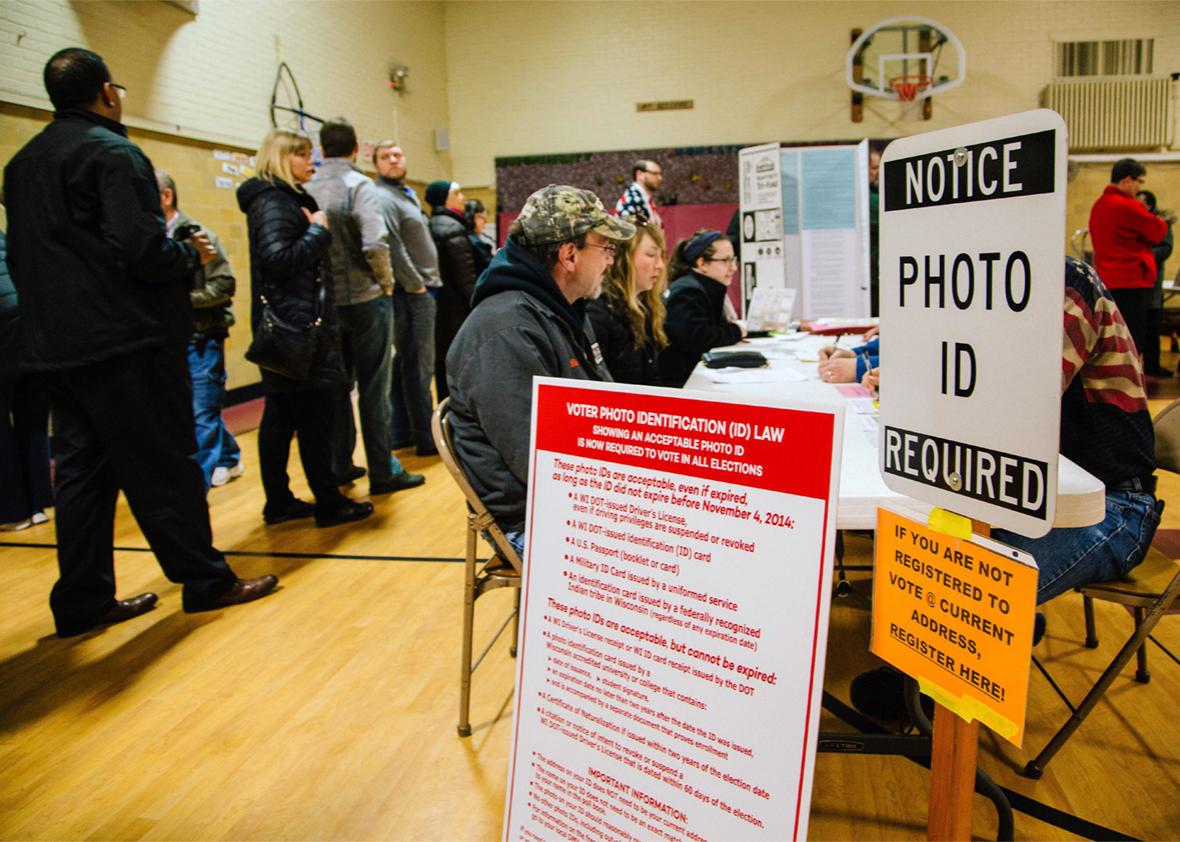The biggest news out of the Wisconsin primary isn’t about the horse race, which is largely unchanged. It’s about the election itself—about how the voting happened. As soon as polls opened in urban centers like Madison and Milwaukee, there were reports of long, almost intolerable waits. Students at universities around the state faced hourslong lines to cast a ballot. Others waited just as long for a chance to change their registration.
The proximate cause of these long lines in urban, student-heavy areas is the state’s new voter identification law backed by the Republican legislature and Gov. Scott Walker. It implements strict new requirements for valid identification that excludes most student IDs (in response, some Wisconsin schools have begun issuing separate identification cards for students to vote) and requires voters without official identification to go through a cumbersome process even if they’ve voted in the past. Writing for the Nation, Ari Berman describes elderly, longtime voters who were blocked from the polls for want of the right papers. “Others blocked from the polls include a man born in a concentration camp in Germany who lost his birth certificate in a fire; a woman who lost use of her hands but could not use her daughter as power of attorney at the DMV; and a 90-year-old veteran of Iwo Jima who could not vote with his veterans ID.”
But this was more than predictable—it was the point. “I think Hillary Clinton is about the weakest candidate the Democrats have ever put up,” said one Wisconsin Republican congressman, Rep. Glenn Grothman. “And now we have photo ID and I think photo ID is going to make a little bit of a difference as well.”
If the urgency of the issue wasn’t obvious, Grothman made it plain. Voter ID laws in Wisconsin and beyond are a direct attack on democracy, an attempt to rig the game by blocking whole groups of Americans from the polls. In what appears to be a strong cycle for their party, Democrats should take what happened in Wisconsin as a siren for action. Restoring democracy and protecting it from these attacks should be at the center of the party’s agenda.
The burden of voter ID laws falls hardest on the marginal members of society, who are predominately nonwhite, elderly, or both. In Wisconsin, 9 percent of registered voters (300,000 people) lack government-issued identification and fall disproportionately under those groups. And while Wisconsin provides voter ID at no cost through its Department of Motor Vehicles, the dirty secret is that this is a difficult and cumbersome process given the extremely limited hours for DMV offices. (Just 31 of Wisconsin’s 92 DMVs hold normal business hours and most are open just twice a week.) And worse, as Berman notes, Republican legislators in the state made no provision for voter education. They also shut down the state board that monitors elections.
Wisconsin isn’t the only place where voting has been hampered by voter identification laws. In Arizona, a similarly strict law—compounded by a Republican-led drive to close voting precincts in heavily populated areas—brought long waits for people who wanted to cast a ballot. As many as 20,000 Americans weren’t able to vote, many of them Latino.
Three years ago, the Supreme Court struck down the “preclearance” provisions of the Voting Rights Act, which required states with a history of discrimination to get the federal government’s permission before making any changes in how they run elections. Since then, Republican legislatures like those in Wisconsin and Arizona have adopted draconian identification laws that stand as meaningful barriers to the right to vote. They act as de facto poll taxes, forcing voters to spend time and money in order to exercise their constitutional rights. Thirty-three states will require voters to show identification at the polls this November, and the likely outcome will be long lines and complications for countless voters.
Beyond the sort of educational measures that Wisconsin didn’t bother with, it’s too late to do anything this year about the spread of voter ID and other barriers. But this should be a wake-up call for Democrats. Unless there’s pushback, these restrictions will become part of the firmament of our elections, effectively disenfranchising those on the margins of American life. For Democrats now and in the future, reversing those laws—and enhancing voter access—has to be a priority. On the national level, both Clinton and Bernie Sanders should tout their plans to restore the Voting Rights Act and build more voter protections. Below that, prospective Democratic governors and state lawmakers should place voter access at the top of their agendas, a first item for incoming administrations. Everything, from automatic registration and mail-in balloting to ending felon disenfranchisement, should be on the table.
This isn’t just the right thing to do; it’s the smart thing to do. If Democrats believe that they benefit from more voters and larger electorates, then they would do well to mimic the Republican approach, but in reverse: Use their power to tilt the playing field toward more access, more participation, and more democracy.
